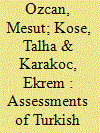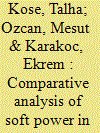| Srl | Item |
| 1 |
ID:
139254


|
|
|
|
|
| Summary/Abstract |
Using original public-opinion polls and elite interviews conducted in 2012, this article analyzes the perceptions of Turkish foreign policy regarding the Arab Uprisings and the Syrian conflict in three Middle Eastern countries, Egypt, Iraq and Iran. It finds that ethnic, sectarian and religious groups in these three countries vary significantly in their views on Turkish foreign policy regarding both the Arab Uprisings and the Syrian conflict, although the same identity-related factors have a less salient effect at the elite level. The findings also suggest that the intersection of ethnicity and sect shapes people's attitudes toward Turkish foreign policy in Iran and Iraq. Sunnis, except for Kurds in Iran and Iraq, tend to have a positive view of Turkish foreign policy, while Shia Turkomans in Iraq tend to have a negative one.
|
|
|
|
|
|
|
|
|
|
|
|
|
|
|
|
| 2 |
ID:
146344


|
|
|
|
|
| Summary/Abstract |
This study explores the relationship between ethnic, sectarian, and religious identities and soft power in the Middle East and North Africa (MENA) region in the immediate aftermath of the Arab Uprisings. Utilizing original public opinion surveys conducted in Egypt and Iraq in 2012, we find that identity-based allegiances play a major role in groups’ choices regarding which countries’ increasing involvement in the region are seen favorably and which countries are seen as an ideal model for the region. Sunnis are likely to view Turkey and Saudi Arabia positively in both regards, whereas Shiites are more supportive of Iran. But our results also suggest that crosscutting cleavages should not be overlooked: Sunni Kurds are less likely to hold positive attitudes toward Turkey and Saudi Arabia. Our findings also show that Copts, a religious minority in Egypt, hold positive attitudes toward the United States and negative ones toward Saudi Arabia and Iran. These findings contribute to both the theoretical literature on soft power and the debates on international competition for influence in the MENA region by emphasizing the role of ethnic and religious identities in shaping attitudes toward international actors.
|
|
|
|
|
|
|
|
|
|
|
|
|
|
|
|